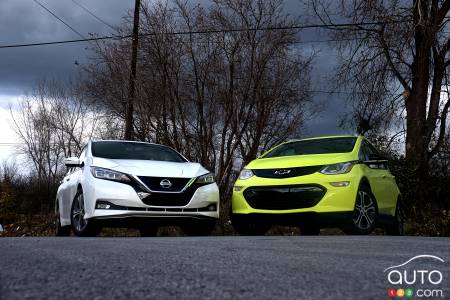Far back in time - in 2012 to be exact - the Liberal government of Quebec (then led by Jean Charest), created a green plan and announced its intention to have 300,000 electric vehicles (EVs) and plug-in hybrid vehicles (PHEVS) on the province’s roads by 2020.
Many industry analysts saw proof in this that the premier had a penchant for wearing rose-coloured glasses. At the time there were but a few hundred EVs on Quebec roads, and a charging network just struggling to get on its feet.
The target was reduced to 100,000 in 2016, at which time there were 8,500 EVs registered in Quebec. Meanwhile Hydro-Quebec’s network of charging stations was starting to take shape. Models like the Nissan LEAF and the popular Chevrolet Volt were now available, along with others like the Ford Focus and the Mitsubishi i-Miev. But still, few thought that 100,000 target was attainable by 2020.
Times, they are a’ changin’
The government of Canada’s recently announced iZEV Program offering incentives to buyers of EVs takes effect on May 1, 2019. It’s an ambitious program, and for residents of seven Canadian provinces it’s the first time they have access to a discount that will make their next EV purchase more affordable. We try to demystify what the program means for consumers in Canada.
See our list of the Top 8 All-Electric Vehicles in Canada in 2019
The program’s basics
- The new discount is available on purchases or leases (of at least 48 months) made as of May 1, 2019
- All-electric or plug-in hybrid vehicles (PHEVs) with a base price of under $45,000 are eligible
- The discount is applied directly on the vehicle price at purchase at the dealer (but taxes are calculated on the full price, before application of the discount)
- The incentive can be applied to existing provincial EV-incentives discounts (currently in Quebec and British Columbia only)
- The federal discount is only offered to each consumer once per calendar year
The perfect (electrical) storm
Since 2018, virtually all auto manufacturers have laid out and put into motion ambitious electric mobility plans; for most of them the go-to-market dates for electric vehicles being developed are in 2020 and 2021. This means that the market will be welcoming a host of new products in the next 12 to 18 months.
Combining federal and provincial incentives
At present, Quebec and British Columbia are the only two provinces with programs in place; maximum incentives are $8,000 in the former province, $5,000 in the latter. Residents of those provinces will be able to combine the discounts offered by the two levels of government as of May 1.
$45,000 MSRP base price is the ceiling
Starting May 1, then, buyers of an eligible all-electric vehicle will be able to claim $5,000 as part of the iZEV program. Eligible vehicles must have a starting MSRP (Manufacturer’s Suggested Retail Price) of under $45,000, and the actual selling price must not exceed $55,000.
Take the example of the Chevrolet Bolt. Its base price is $44,900, while the Premium version retails for $49,800. Even if you buy the top-end trim, you will still get to claim the $5,000 discount.
Discount of $5,000, or $2,500?
Fully electric vehicles are eligible for a discount of $5,000, as long as they meet the pricing condition indicated above. As for PHEVs, longer-range models with a battery capacity of 15 kWh or more are eligible for the $5,000 amount, while shorter-range models earn buyers a $2,500 discount. Examples of the former are the Honda Clarity and the Chevrolet Volt, while the latter category includes models like the Mitsubishi Outlander and Toyota Prius Prime.

The “Pacifica clause”?
There’s also something unofficially called the “Pacifica clause”, which makes an all-electric or hybrid vehicle priced at between $55,000 and $65,000 eligible for the $5,000 incentive, IF it seats seven occupants. At this point, other than the Chrysler Pacifica Hybrid minivan, the only other vehicle likely to fall into this category is the upcoming new Tesla Model Y.
Lots of inventory
Fun fact: Since Ontario abandoned its provincial EV rebates program in September 2018 (program that afforded EV buyers in that province a whopping $14,000 discount on purchase of an all-electric vehicle), Quebec dealers have absorbed all of Ontario dealerships’ excess inventories of EVs. As a result, supply currently outstrips demand in La Belle Province, and buyers there are far less likely to have to wait to take delivery of their new vehicle.
(Less) fun fact: The last few weeks have seen gasoline prices spike up again in most regions of Canada, and they’re not expected to fall much over the next few months.
All of this means a potential perfect storm brewing for May 1, wherein the reasons to “go electric” suddenly multiply and get more compelling. We’ll benefit from More Models, More Stock and More Discounts when it comes to EVs.

Case study: Quebec
According to data compiled by the AVEQ (Association des véhicules électriques du Québec), in September 2018 there were 35,170 EVs and PHEVs registered in Quebec. The rate of annual growth for these types of vehicles is around 50% per year, says AVEQ president Simon-Pierre Rioux. A graph on the AVEQ website shows that at that pace, there should be 100,000 electric vehicles in Quebec by December 23, 2020 – eight days ahead of the deadline!
Calculating your savings on an EV
Perfect storm or no perfect storm, what you want to know is if you’ll save money on your EV to go along with your environmental good deed, in comparison with a combustion-engine vehicle.
We did this little exercise: You’re a consumer in Quebec, and you’re looking at the Kia Soul, available in gas-engine and all-electric versions. Both are fully revised for 2020, and Kia has managed to increase the available range in the electric model to 385 km (at a higher price, naturally).
The pricing for the gas-engine Soul starts at $21,995, while the EV starts at $42,595.
| ... | Kia Soul | Kia Soul EV | |
| Base price | $21,995 | $42,595 | |
| w/GST/PST (Quebec) | $25,288 | $48,973 | |
| Discount | 0 | $13,000 (maximum discount available in Quebec | |
| Final price | $25,288 | $35,973 | |
| Interest rate | 0.99% | 0.99% | |
| Fnancing term | 48 months | 48 months | |
| Weekly payments | $118.38 | $183.00 | |
| Annual consumption | $1,900 (20,000 km) | $328 (20,000 km) |
In this example, an electric vehicle eligible for two government discounts (federal and provincial) becomes cheaper to have owned than the regular model after about five years, if you drive an average of 20,000 km, and more quickly than that if you drive fewer km per annum.
Obviously, there are several variables at play that can change the timeline, but the point is that the available discounts (especially for residents of B.C. and Quebec) really make an EV into a money-saver if you hang on to it for a while.
And the automakers?
The question now becomes, will automakers be able to meet demand if it grows quickly? With the new iZEV program in place, B.C. residents now benefit from up to $10,000 in discounts to help persuade them to go electric; in Quebec it’s $13,000; and in other provinces, motorists will get a first taste of an incentive program linked to purchasing an EV. Demand will grow, we just don’t know how fast. And will auto manufacturers take into account the post-May 1 reality in Canada?
A lot of questions for which there are still no sure answers.

Those wanting to learn more about the new iZEV program can visit their webpage dedicated to the program, and see the updated list of vehicles eligible for a discount.
See also our:
2019 Hybrid and Electric Car Guide, Part 1: The Hybrids
2019 Hybrid and Electric Car Guide, Part 2: The Plug-In Hybrids
2019 Hybrid and Electric Car Guide, Part 3: The All-Electrics



